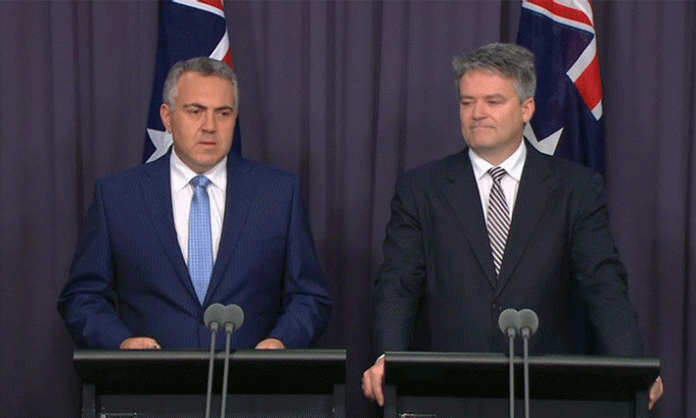It’s hard to think of a character better qualified for the job of axeman than Business Council of Australia president Tony Shepherd.
The BCA is the powerful lobby group of Australian big business, made up of the CEOs of Australia’s top 100 companies. It’s been agitating for a “bold” program of cuts to the public sector for months. Now, handpicked to head Abbott’s probe into national spending – the commission of audit – Shepherd can finally start swinging.
Tony “we can’t just keep spending” Shepherd is open about his agenda and the interests he will represent. Just a day after his appointment was announced, he was writing in The Australian about the upright moral character of privatisation. Handing public assets to big business when it can sniff a profit is part of a “virtuous cycle”, he said. Unsurprisingly, he thinks that government should be reducing its size and scope and “speeding up privatisation”.
Shepherd is something of a pioneer in turning a profit from outsourced government contracts and infrastructure projects. Until recently he was chairman of Transfield Services. Transfield has benefited from over half a billion dollars of government contracts, including more than $180 million for maintaining detention facilities in Nauru.
The BCA president won’t receive criticism of his business practices from any of his audit commission mates. Joining him on the five person body is Peter Boxall, the Howard-era chief of staff responsible for overseeing the introduction of WorkChoices; corporate investment consultant Tony Cole; and former state bureaucratic heavy Robert Fisher.
Rounding out the lopping crew is former federal Liberal minister Amanda Vanstone. Vanstone today is no less the vicious conservative warrior she was when serving in Howard’s ministry. She last year likened fleeing refugees to ants chasing sugar.
In parliament, as education minister, she implemented $2.3 billion in cuts to university funding and slashed the welfare payments of the country’s poorest students. Vanstone, a parliamentary colleague once suggested, appears to take real delight in attacking the most vulnerable.
Formally, this lot will conduct a review of all government functions, activities and spending. The audit’s terms of reference are a broad collection of management buzz words and neoliberal coding: “efficiency”, “contestability” and “consolidation” meet “flattening”, “rationalising” and “privatisation”.
The federal government has made it clear that everything is on the table and no corner is safe. “Every area of government will be examined. There are no restrictions”, warned Treasurer Joe Hockey. The commission even is charged with looking into the “architecture” of commonwealth-state relations.
An exercise of this magnitude could be expected to take years. Similar undertakings at a state level have. However, the audit’s “findings” will be reported to the government in two stages, the first report due at the end of January, the second in March. This is a five month timeline.
Commentators have wryly noted that five months is a “brief life” for an inquiry of this sort. Some have almost sympathised that the commissioners will have to work at “breakneck” pace to get through the task. No doubt any concerns that the appointees have about their workload or the short term nature of the gig are ameliorated by the $1,500 daily payment each of these parasites will pocket.
The reality is that the commission will be next to no work at all. It is little more than a formality – political window dressing for plans that have largely been laid out – not by any elected government, but by Australia’s major corporate interests.
A detailed “action plan” – essentially Australian capital’s log of claims – was released by the BCA in July. It covers much the same ground as Abbott’s audit and is openly expected to form the basis of the audit commission’s “findings”.
Abbott is only too happy to hand over the keys to the pantry.
The government has already confirmed the sale of Medibank Private and has not ruled out privatising everything from students’ HECS debts to Australia Post.
Hockey has made no secret of his desire to gut the public sector and will no doubt use the audit recommendations to try to flatten, rationalise and consolidate thousands, if not tens of thousands, of workers out of a job.
As far as welfare and social services go, the possibilities are frightening. Obviously, outsourcing is on the cards, as is the elimination of entire services and programs. Also in the mix is “user-charging and incentive payments” to “encourage self-provision of services by individuals”. You don’t have to be a Rhodes Scholar to see that social services, individually self-provided, are not social services at all.
Mass sackings, sell-offs and cuts to services are far from popular. Even the best laid neoliberal plans can be undone by determined and organised resistance from our side. So far, the response from the unions has been spiritless, to put it generously.
Recent history has shown, though, that if unions were serious about a fight we could stop this offensive in its tracks.
The collapse, in 2008, of NSW Premier Morris Iemma’s plans to privatise electricity – in the face of massive union opposition – remains a source of ongoing resentment in the Australian ruling class.
It’s about time Abbott, Shepherd and the like had another reminder of the sting of defeat.









